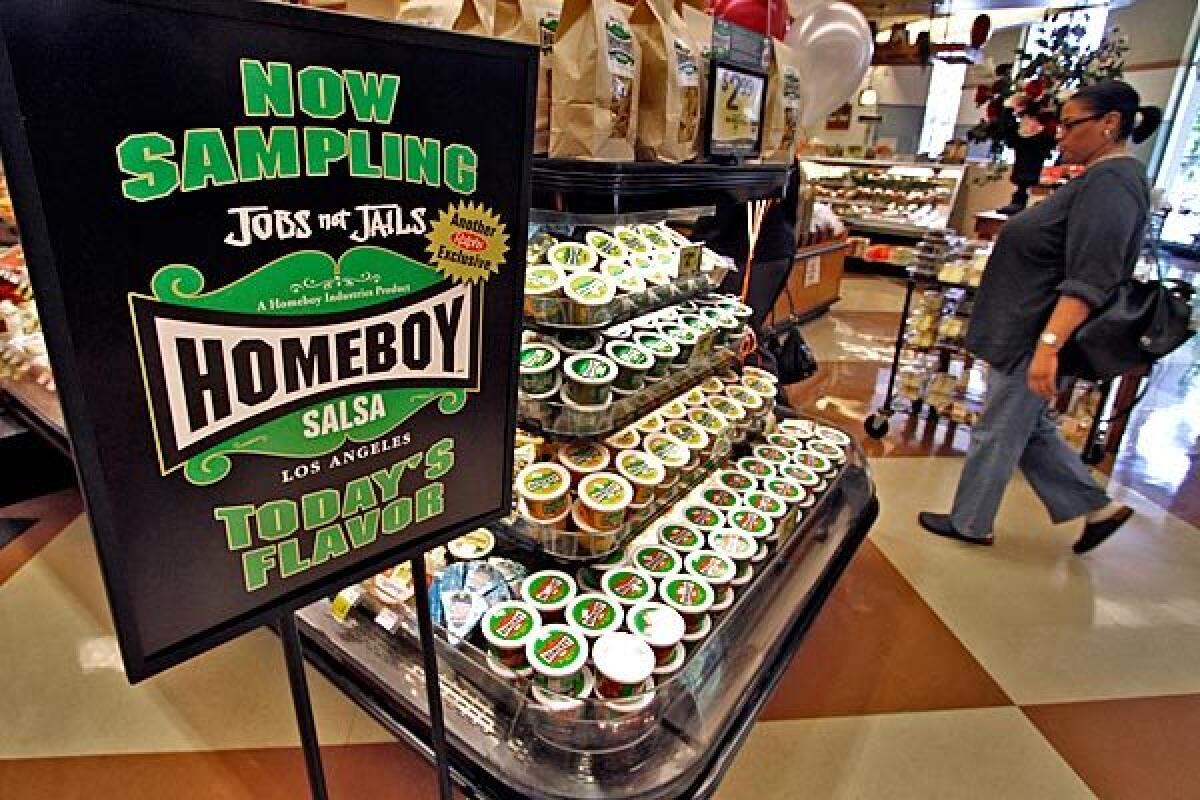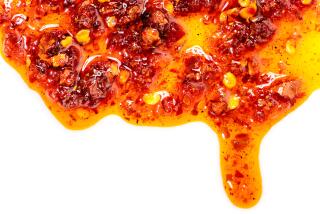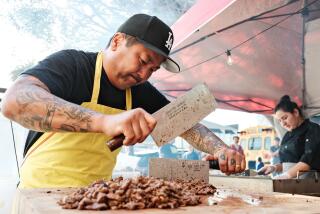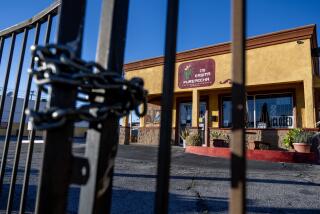Homeboy Industries pins hopes on chips and salsa

The chips are falling into place for Homeboy Industries.
The hottest-selling snack item at 256 Ralphs deli sections across Southern California in the first weeks of February wasn’t pretzels, or cheese puffs, or pita or bagel crisps. According to the Compton-based supermarket chain, the No. 1 seller was Homeboy Industries’ tortilla chips and salsa.
Homeboy Industries, the Los Angeles nonprofit founded by Father Gregory Boyle to help former gang members and convicts turn their lives around, launched its line of chips and salsa at Ralphs last month as part of an effort to revive its hard-hit finances. The high hope is that they might be the start of Homeboy’s version of Newman’s Own — the company created by the late Paul Newman that transformed salad dressing into social enterprise.
So will chips and salsa turn a community institution into a national consumer brand that tunes grocery shoppers in to the problems of disaffected youth?
“The aim is to expand the brand so that Homeboy becomes a household name and then a household idea,” says Boyle (a Jesuit priest also affectionately known as “Father G”), whose job-training program — started 23 years ago at Dolores Mission parish — has helped thousands of young people from several hundred L.A. gangs find work.
As part of the Homeboy logo puts it: “Jobs not jails” (a catchier version of the motto, “Nothing stops a bullet like a job”). Instead of the face of a celebrity such as Newman on the packaging, the label shows two young men with shaved heads and goatees wearing baggy Homeboy sweatshirts and outlines a mission to reform through work experience.
Homeboy’s businesses — such as a bakery and a silkscreen company — aim to provide jobs for its clients, but the chips and salsa are for now strictly a foray into a new revenue stream. The salsas are based on Homegirl Café chef Patricia “Pati” Zarate’s recipes but actually are made by El Burrito Food Products Inc. (which claims it was the first company to commercially package fresh salsa) in City of Industry. The chips are made by Snak King, also based in City of Industry. Homeboy receives part of the sales in an agreement with the manufacturers, the distributor and Ralphs.
Industry analysts note the challenges of breaking into the already-crowded about-$20-billion U.S. “salty snack” market, which is dominated by Frito-Lay and Kraft Foods. But just getting Homeboy chips on the shelves is a coup, the result of a collaboration with Ralphs, which waived slotting fees — what food manufacturers sometimes pay grocery companies to carry a new product — and donated $50,000 to the project.
Proceeds go to funding Homeboy services such as tattoo removal and counseling. “If we can increase revenue, we could fundraise less,” Boyle says. Or not at all. “I don’t know if we can ever reach that goal. But at least so we’re not white-knuckling it.”
Boyle knows white-knuckling: Last year, Homeboy laid off about 330 people and nearly shut its doors when it couldn’t raise the $5 million needed to operate. Because of donations, “things have stabilized. We’ve brought back senior staff, about 100 jobs,” he says. “We should have had a cushion, more money after building” new headquarters.
In an industrial part of Chinatown, the bustling Homeboy complex — a $12.5-million project that opened in 2007 — houses the Homegirl Café and Homeboy Bakery, part of the organization’s small conglomerate of businesses. In the same building where Zarate turns out beef tinga tacos, linguine with jalapeño pesto and tofu salad for the cafe, ex-gangsters take classes such as relationship building, solar panel installation and Homiewood: Filmmaking for Life.
Meanwhile, Homegirl Café plans to expand to Los Angeles International Airport, and a Homeboy General Store is slated to open this spring in City Hall downtown. The bakery, Homeboy’s original business and the employer of about 40 people, turns out more than 3,000 breads and pastries a day — croissants, cookies, tarts, baguettes and sourdough loaves that are sold at 17 farmers markets and increasingly at “foodie” spots such as Intelligentsia coffee houses in Silver Lake and Pasadena and the new Black Cat Bakery on Fairfax Avenue.
Boyle is sitting in his office at Homeboy headquarters on a recent weekday with a printed e-mail and reads off sales numbers. “It’s the first thing I announced at my morning meeting. We’re the No. 1 snack item. In the first week, we sold 8,793 units of chips and 10,287 units of salsa.”
“From concept to store shelves, it took less than six months,” says Bruce Karatz, former chief executive of KB Homes who now helps Homeboy as a consultant. The Ralphs downtown had offered the mango and morita salsas made by Homegirl Café in the deli section beginning in 2009, but discussion of commercially packaged chips and salsa started last June. “It just went very quickly. People like helping us.”
There are plans to offer other products and to approach Cincinnati-based Kroger Co., which owns Ralphs, to put Homeboy goods on store shelves outside of Southern California. “The big dream is to get Homeboy chips and salsa into the more than 3,600 Kroger stores” in the U.S., says Kendra Doyel, vice president of marketing at Ralphs.
The next Homeboy product? Zarate’s salad dressings (think lime and cilantro, creamy chipotle, or hibiscus and cayenne sea salt). “The more food products, the more shelf space, the more sales, the more revenue to support Homeboy’s services,” Karatz says.
If the challenge outside of Southern California might be to attract shoppers who aren’t familiar with Homeboy Industries — with zero ad dollars — that isn’t a problem in downtown Los Angeles. “You know, the climate has so changed in 23 years,” Boyle says. “People took offense at working with gang members. Now Homeboy is known in California, and people have good feelings about it.”
Inside the Ralphs at 9th and Flower streets, racks of Homeboy tortilla strips stand next to a refrigerated case filled with Homeboy salsa. Matthew Bray, a manager at the Futon Shop, has two bags of Homeboy chips in his cart. “I saw [Boyle] on TV and what he’s doing, and I think it’s amazing. At first I bought just one bag thinking it can’t be all that bad, and now I’m buying two at a time. I’m addicted.”
More to Read
Eat your way across L.A.
Get our weekly Tasting Notes newsletter for reviews, news and more.
You may occasionally receive promotional content from the Los Angeles Times.







